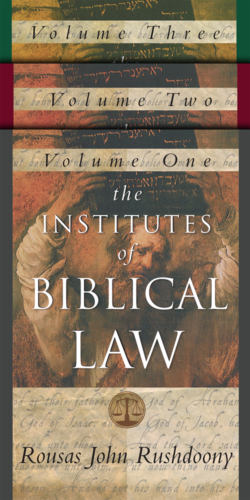The Institutes of Biblical Law Set

The Institutes of Biblical Law Vol. 1
Our newly printed 2020 edition with the same content by extended indexes (180 pages) which make it even more useful!
The Institutes of Biblical Law has as its purpose a reversal of the present trend. It is called "Institutes" in the older meaning of that word, i.e., fundamental principles, here of law, because it is intended as a beginning, as an instituting consideration of that law which must govern society, and which shall govern society under God.
To understand Biblical law, it is necessary to understand also certain basic characteristics of that law. In it, certain broad premises or principles are declared. These are declarations of basic law. The Ten Commandments give us such declarations.
A second characteristic of Biblical law is that the major portion of the law is case law, i.e., the illustration of the basic principle in terms of specific cases. These specific cases are often illustrations of the extent of the application of the law; that is, by citing a minimal type of case, the necessary jurisdictions of the law are revealed.
The law, then, asserts principles and cites cases to develop the implications of those principles, with is purpose and direction the restitution of God's order.
The Institutes of Biblical Law Vol. 2: Law & Society
The relationship of Biblical Law to communion and community, the sociology of the Sabbath, the family and inheritance, and much more are covered in the second volume. The purpose of this second volume is to point men to God and His Word for the government of their lives and our world. To serve and magnify God is the greatest of privileges and callings, as is the reconstruction of all things in terms of the Word of God. This, after all, is the purpose of life, to be conformed to God. Contains an appendix by Herbert Titus.
The Institutes of Biblical Law Vol. 3: The Intent of the Law
God's law is much more than a legal code; it is a covenantal law. It establishes a personal relationship between God and man." The first section summarizes the case laws. The author tenderly illustrates how the law is for our good, and makes clear the difference between the sacrificial laws and those that apply today. The second section vividly shows the practical implications of the law. The examples catch the reader's attention; the author clearly has had much experience discussing God's law. The third section shows that would-be challengers to God's law produce only poison and death. Only God's law can claim to express God's "covenant grace in helping us."
Read inside...
| Product Contains | Institutes Volumes 1-3 |
| Media Length | 3 Hardback Volumes |
| Topics | Biblical Law, Church History, Government, Theology |